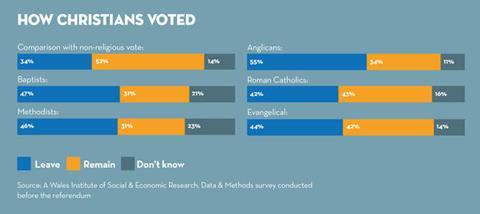
The UK’s decision to vote to leave the European Union (52%–48%) and the ensuing furore is the biggest shake-up of British politics in a generation. Depending on your point of view, the 23rd June was either Independence Day or a full-blown disaster.
As the polls closed, few were calling it for Brexit. Even UKIP’s Nigel Farage appeared despondent, predicting that Remain would win. But by the time most people were waking up, the results were clear: Britain had voted to leave and David Cameron was stating his intention to resign as Prime Minister.
In the weeks following the vote, social media erupted with opinion. The angriest voices were often the loudest, with some demanding a second referendum and others responding with shouts of ‘bad loser!’
Another, much more serious, unintended, consequence of the vote was an apparent rise in the number of hate crimes. According to the National Police Chiefs’ Council, the number of hate crime incidents reported since the EU referendum has increased fivefold. Religious and political leaders were unanimous in their statements that such acts could never be justified.
CHRISTIAN OPINION
Like a large number of political issues of our time, there appeared to be no single ‘Christian view’ on the subject of the EU. The Archbishop of Canterbury voted to Remain, while newspaper columnist Rev Giles Fraser helped lead the Leave campaign for Christians For Britain. Steve Chalke campaigned to Remain and Ann Widdecombe wanted out.
Aside from mainstream political discourse about the economy, sovereignty and immigration, there were inter-Christian discussions about whether the institution of the EU was comparable to Babel (do both of these projects undermine the diversity of individual nations?). Writing on the Jubilee Centre’s website, Dr Michael Schluter CBE said that ‘biblical teaching portrays national identities and diversity as ordained by God’ and argued that this should not be ‘discarded lightly’. David Hathaway from Eurovision Mission to Europe also favoured Brexit. He said the EU was an ‘ungodly yoke’ that has ‘marginalised Christian faith’.
Founder of the Newfrontiers church network, Terry Virgo, took a different view. He wrote on his blog that remaining in the EU would make it easier for Christians to move freely around Europe and plant churches.
Virgo said: ‘My motivation is entirely based on what seems best for gospel advance…God told us to plant churches across the UK with our ultimate goal to reach Europe and beyond. I want to keep my eye on the goal and be obedient to the vision.’
THE VIEW FROM EUROPE
Gerard Kelly of The Bless Network has spent decades ministering in Europe. He says the reaction across the continent to the referendum vote was one of ‘shock and confusion’.
He said: ‘It’s like when your parents call you into the living room to tell you that they’ve both retained lawyers to oversee their divorce. You knew they were arguing but you had no idea they would go that far.’
As a church leader, Kelly is concerned the Brexit vote will affect evangelistic efforts in Europe.
He said: ‘The young adults we work with have been learning more and more to see themselves as European. They are a generation comfortable with diversity, committed to global culture and keen to travel. This feels to them like a big step backwards. The key to contemporary mission in Europe is cooperation. Not so much sending UK missionaries “over there”; more getting to know and love our near neighbours. This will feel to many as a rejection of such unity and a return to separateness.
‘Now is a great time for those of us who truly love our French, German, Polish and other neighbours to say so. Most Brits don’t know that while they were voting on 23rd June, public buildings right across France were flying the [British] Union flag. It was an act of love. Let’s make sure that it is reciprocated in the coming months.’
THE FUTURE
In the apparent chaos that seems to have descended post-referendum, it’s easy to overlook the fact that, for now, the UK very much remains part of the EU. We are unlikely to exit Brussels in any meaningful way for at least another two years.
All of this means we can expect a lot more political debate about our relationship with the EU. Writing on the Premier Christianity blog, Baptist minister Chris Goswami suggested one helpful way of beginning this process: ‘We need to reach out to understand the people we don’t understand. The referendum revealed deep divisions between old and young, city and suburb, and disturbingly between haves and have-nots.
"We Need To Reach Out To Understand The People We Don’t Understand"
If I don’t understand people’s reasons for not agreeing with me, mine can only be a negative voice.’
The Evangelical Alliance’s Danny Webster believes another way of understanding the time we live in is to view it as an opportunity to display true unity: ‘We’ve got to build unity in the transparency of disagreement. This is a task we have to do prayerfully and practically. We are past the time for good sentiments and symbolic gestures…The work of reconciliation requires that we are honest about these very real disagreements; we cannot pretend that other people think the same as we do.
‘Our unity must always be for a purpose; it’s not a garden party type of civility that ignores what’s really going on. Our unity must drive our mission. It is what provides us with the impetus to make Jesus known in our communities and across the country.’
The Brexit vote divided families, friends and communities. But if Christians can show true love to those we disagree with, that in itself will send a powerful message to an otherwise divided country. It’s in this context that the Church must remain unified around what matters most: making Jesus known. Whether that task will be easier or more difficult in a post-Brexit Britain remains to be seen.





























